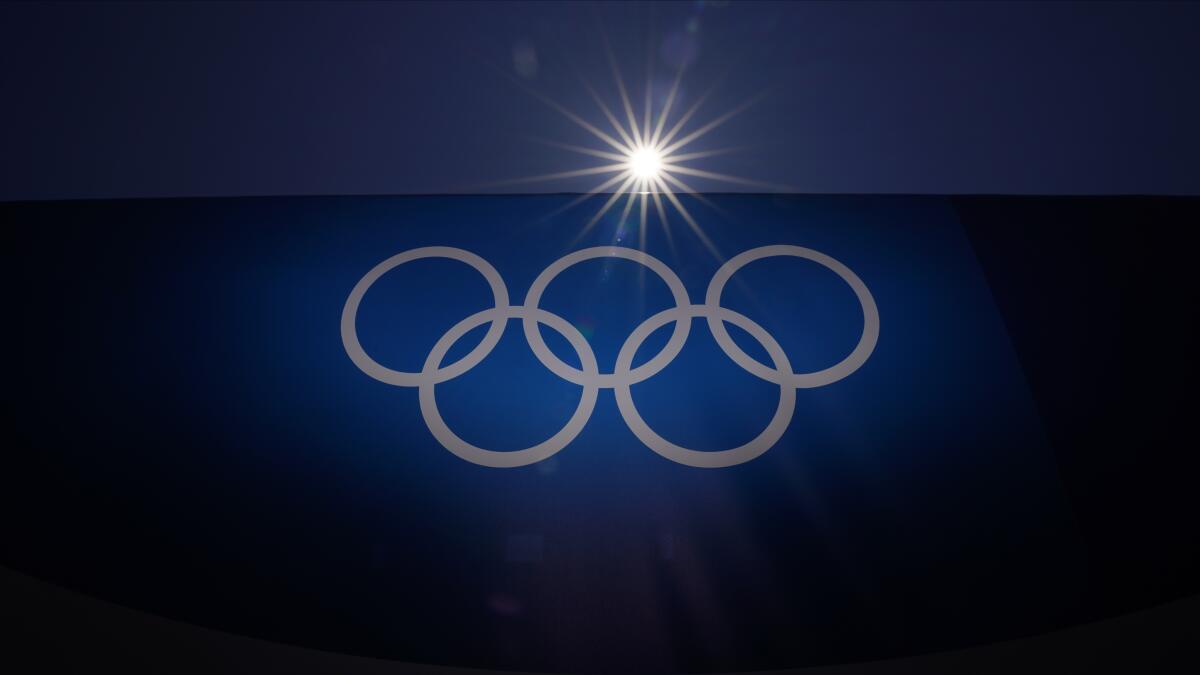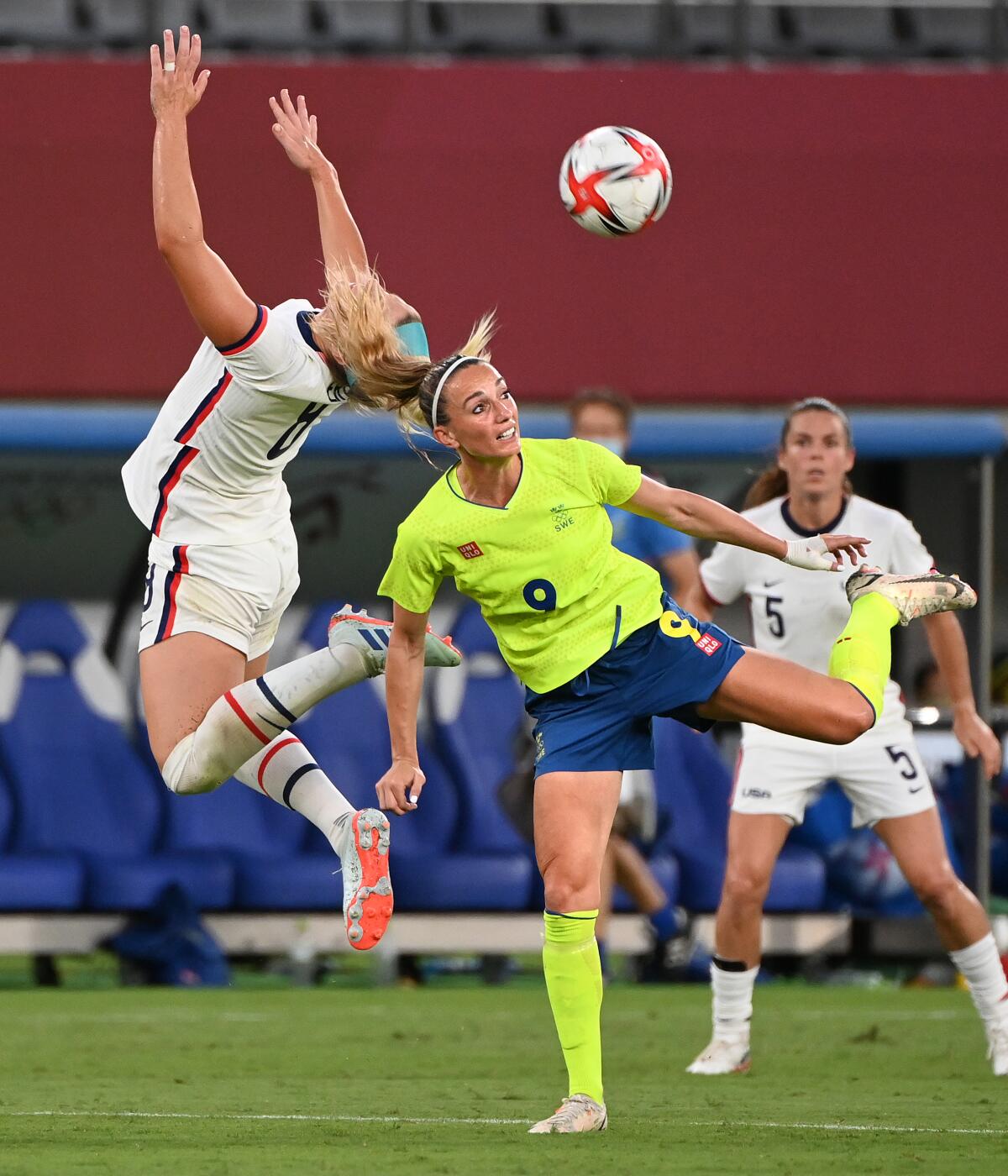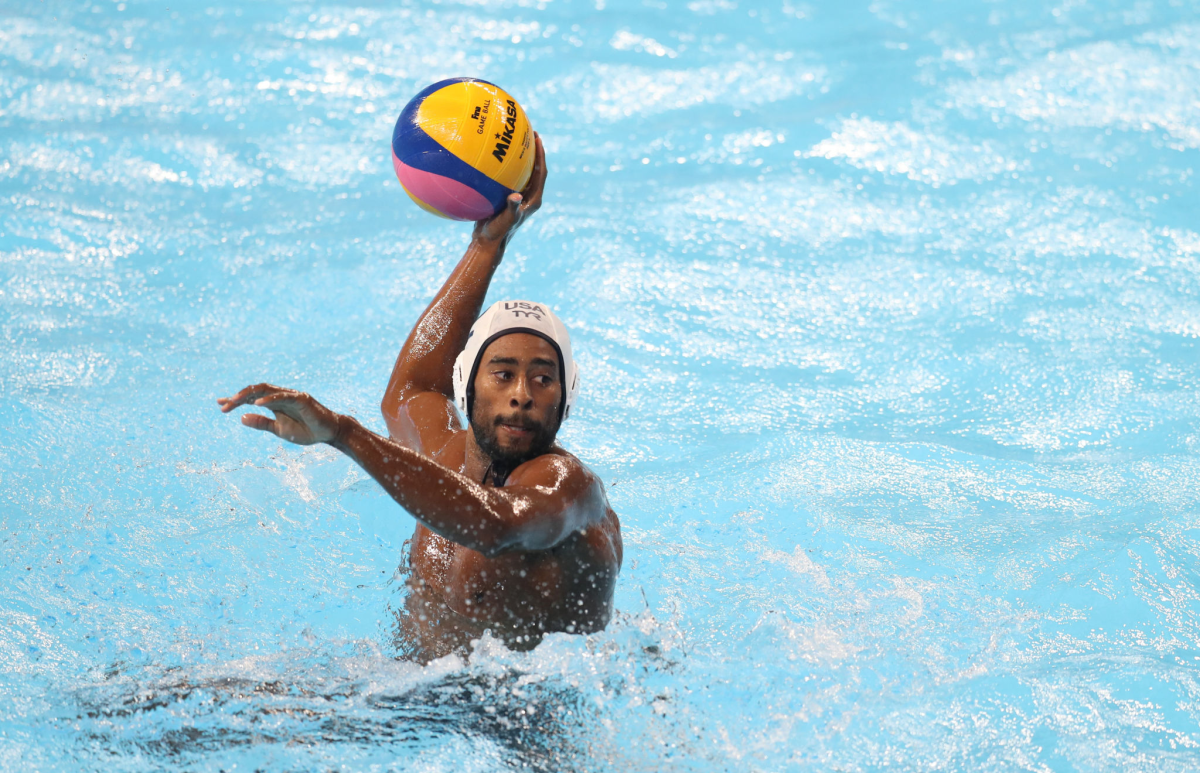The Sports Report Olympics Edition: A great, big geography lesson

- Share via
TOKYO — The Olympics aren’t just a time to be captivated by new and familiar heroes. They’re also a chance to learn geography.
My name is Ben Bolch, one of the caretakers of the Olympics newsletter, and I fully acknowledge that before this week I had never heard of Burkina Faso. Or Vanuatu. Or Sao Tome and Principe.
Go beyond the scoreboard
Get the latest on L.A.'s teams in the daily Sports Report newsletter.
You may occasionally receive promotional content from the Los Angeles Times.
Those are among the handful of places that entered my consciousness while researching the nation-by-nation breakdown of all 11,649 Olympians. It was more than a bit humbling.
Before I explain not having previously learned all 205 nations and territories (including the Refugee Olympic Team and the Russian delegation known as ROC), here’s what you need to know:
TV schedule for Thursday and Friday
Mexico dominates vs. France in men’s soccer
How Tokyo Games could impact Olympic movement
USWNT remain in hunt for gold despite loss
Back to that geography lesson...
A private-school education apparently doesn’t guarantee mastery of the globe. I just hope that Northwestern doesn’t try to revoke my degree.
At least I’m open to learning something every day. Here’s what I discovered about those nations:
Burkina Faso is in west Africa, south of the Sahara Desert, and was once known as Upper Volta. Its seven-person Olympic delegation includes swimmer Angelika Ouedraogo, who is studying for her doctorate in biosystems and agriculture engineering at Oklahoma State.
Vanuatu is a collection of about 80 islands in the South Pacific Ocean. Its three-person delegation includes Yoshua Shing, known as the Ping Pong Prince of the Pacific.
Sao Tome and Principe is an island in the Gulf of Guinea that’s the world’s smallest Portuguese-speaking country. Its three-person delegation includes Buly da Conceicao Triste, the country’s flag bearer at the opening ceremony of the 2016 Games in Rio de Janeiro.
Words matter
It was a day to pay for things said on Instagram … and in 1998.
Rosie Gallegos-Main, a longtime chiropractor for the U.S. women’s wrestling team, apologized after comparing Olympic COVID-19 protocols to Nazi Germany on social media.
“We went from ‘Flattening the curve in 14 days’ to ‘Going door-to-door to see your papers’ ” Gallegos-Main wrote. “ ... Gotta admit, I did N-A-Z-I that one coming.”
After drawing widespread rebukes and deleting the post, Gallegos-Main said she was sorry “for my poor judgment and my choice to share this message.” She’s reportedly being allowed to remain with the team while being required to undergo diversity, equity and inclusion training.
There were no second chances for the director of the opening ceremony, who was fired for a joke he made 23 years ago that didn’t age well (though it’s also hard to imagine it going over well at the time it was delivered).
Kentaro Kobayashi was sacked after saying “Let’s play Holocaust” during a comedy routine that came to light after a video clip and script of the show were circulated, sparking widespread outrage.
“We found out that Mr. Kobayashi, in his own performance, has used a phrase ridiculing a historical tragedy,” Olympics organizing committee president Seiko Hashimoto told reporters. “We deeply apologize for causing such a development the day before the opening ceremony and for causing troubles and concerns to many involved parties as well as the people in Tokyo and the rest of the country.”
COVID-19 update

The lack of a protective bubble for athletes, Games personnel and media has heightened anxiety about a virus that continues to spread during the early days of the Olympics. The 12 positive cases reported Thursday represented the second-highest total since statistics started being tracked on July 1, trailing only the 15 positives on July 17.
Six contractors, four Games personnel and two unnamed athletes tested positive Thursday, bringing the total number of athletes who have tested positive to eight. Overall, 87 athletes, Games personnel, media, Tokyo employees, contractors and volunteers have tested positive since the start of the month.
Seen in Tokyo

Organizers weren’t willing to grin and bear it.
A black bear that wandered into the sports complex where the softball games are being played has reportedly sparked countermeasures that include blared music and firecrackers set off.
The bear hasn’t been captured as officials continue their search. If the beast returns, it might be drawn toward games involving the U.S. team, given all its UCLA Bruins.
Enjoying this newsletter? Consider subscribing to the Los Angeles Times
Your support helps us deliver the news that matters most. Become a subscriber.
Women’s soccer

Kevin Baxter on U.S. women’s soccer: The U.S. women’s soccer team started the Tokyo Olympics the same way it ended the Rio Games: by losing to Sweden.
The question now is what does it do next?
In 2016, the U.S. played Sweden to a draw in the quarterfinal before losing on penalty kicks. It was the first time the Americans’ tournament run finished short of a gold-medal game. Wednesday’s 3-0 loss in Tokyo Stadium came in the opening game of the group stage, leaving the U.S. with plenty of time to regroup and plot its revenge.
“Last thing I would want to be right now is the next opponent of this team,” Abby Wambach, a two-time gold medalist, wrote on Twitter. “Nobody puts baby in the corner.”
Maybe. But nobody on the U.S. side was underplaying the gravity of the situation either.
“We got our ass kicked, didn’t we?” Megan Rapinoe said.
Tokyo drama

David Wharton on the Tokyo Olympics: No matter how tough the questions get, no matter how many times reporters ask, the person in charge of running the Summer Olympics remains calm. There is a quiet determination in her voice.
The Games are pushing stubbornly ahead despite concerns about surging coronavirus cases in Japan, where only about 20% of residents have been vaccinated. There has been a costly yearlong postponement, a series of scandals and constant public grumbling.
Still, Seiko Hashimoto, president of the Tokyo Olympics organizing committee, shows no sign of wavering at news conferences held inside the modernistic, gold-sheathed Tokyo Big Sight tower.
“We promised the world to host the Games,” Hashimoto tells the assembled media, insisting that “we have to complete our mission.”
The Tokyo Olympics leadership — and the International Olympic Committee — have a reason to remain steadfast. They have a lot riding on the next 17 days.
Billions of dollars in broadcast revenue are at stake, as are political fortunes and a sense of national pride. For good or bad, Tokyo could impact the future of the Olympic movement and, by extension, the 2028 Los Angeles Games.
Men’s soccer
Kevin Baxter on the Mexico men’s soccer team: Mexico stamped itself as a favorite for its second Olympic soccer title in three tries Thursday, riding second-half goals from Alexis Vega, Sebastián Córdova, Uriel Antuna and Eduardo Aguirre to a surprisingly comfortable 4-1 win over France in the first game of group play at the Tokyo Games.
France got its only score from André-Pierre Gignac, who plays club soccer in Mexico with Tigres, on a second-half penalty kick.
France, which qualified for Tokyo by reaching the semifinals of the UEFA U-21 championships, a tournament played more than two years ago, had hoped to use its first Olympic appearance since 1996 to showcase its deep youth-development system, one second only to Brazil in terms of domestic players exported around the globe.
USC and UCLA at the Olympics

Ben Bolch on USC and UCLA representation at the Tokyo Olympics: The official Olympic mascot is Miraitowa, a cheerful animated character checkered in blue and white that was designed to appeal to young children in Japan.
The unofficial mascots might as well be Tommy Trojan and Joe and Josephine Bruin.
USC and UCLA have combined for 103 Olympic competitors with ties to the respective schools, collectively surpassing all but 32 nations’ delegations. Both schools can claim hurdler Rai Benjamin, who spent two years as a Bruin before becoming a Trojan when he transferred to the school across town.
USC’s army of 63 Olympians tops all but 44 nations and is the most of any school in the United States, leading a Pac-12 Conference contingent of 317 competitors that is the most of any college conference. Stanford ranks second among Pac-12 schools with 53 Olympic athletes, followed by California (47) and UCLA (40).
Swimming
Nathan Fenno on swimming: Two-time Olympic gold medalist Maya DiRado said in a Twitter thread that she is “disappointed” in Michael Andrew’s decision to swim in the Summer Games without being vaccinated against COVID-19.
Andrew holds the top seed in the 200-meter individual medley, one of three events in which he is a medal contender during the swimming competition that starts Saturday.
The 22-year-old from Encinitas is the best-known member of the U.S. team to disclose his decision to not take the vaccine.
DiRado, who won four swimming medals at the Rio de Janeiro Olympics in 2016, responded this week to comments Andrew made in an interview with the Fox Business Network, in which he said he is “representing my country in multiple ways and the freedoms we have to make a decision” to spurn vaccination.
Tennis

Gary Klein on tennis: Ashleigh Barty is the top-seeded woman, Novak Djokovic the top-seeded man, but Naomi Osaka’s return to competition will be the dominant story line when Olympic tennis competition begins Saturday at Ariake Tennis Park.
The draw was announced Thursday.
Osaka, the No. 2-ranked player in the world, will play for the first time since withdrawing from the French Open on May 31. Osaka, who represents Japan, cited the need to take a break for mental health reasons.
Osaka will play Zheng Saisai of China in the opening round. Barty, an Australian who won Wimbledon this month and is the top-ranked woman in the world, will play Sara Sorribes Tormo of Spain.
TV schedule for Thursday and Friday

Here’s a rundown of Olympic events on television Thursday and Friday. All times PDT; includes both live and delayed or replayed broadcasts.
THURSDAY
ROWING
Qualifying heats, 4:30 p.m., NBCSN (live)
MEN’S SOCCER
Egypt vs. Spain, 12:30 a.m., Olympic Channel (live)
Mexico vs. France, 1 a.m., USA (live)
New Zealand vs. South Korea, 1 a.m., NBCSN (live)
Ivory Coast vs. Saudi Arabia, 2:30 a.m., Olympic Channel (live)
Egypt vs. Spain, 3 a.m., USA (replay)
Mexico vs. France, 3 a.m., NBCSN (replay)
Argentina vs. Australia, 3:30 a.m., Olympic Channel (live)
Japan vs. South Africa, 4 a.m., NBCSN (live)
Brazil vs. Germany, 4:30 a.m., USA (live)
Honduras vs. Romania, 5:30 a.m., Olympic Channel (live)
Egypt vs. Spain, 6 a.m., NBCSN (replay)
Mexico vs. France, 8 a.m., NBCSN (replay)
Japan vs. South Africa, 10 a.m., NBCSN (replay)
Brazil vs. Germany, Noon, NBCSN (replay)
Egypt vs. Spain, 10:15 p.m., NBCSN (replay)
Mexico vs. France, 11 p.m., NBCSN (replay)
WOMEN’S SOCCER
U.S. vs. Sweden, 8:15 p.m., NBCSN (replay)
SOFTBALL
U.S. vs. Canada, 2:30 p.m., NBCSN (replay)
FRIDAY
OPENING CEREMONY — 4 a.m., NBC
CYCLING
Men’s road race, 4:30 p.m.-11 p.m., USA (live)
MULTIPLE SPORTS
3X3 Basketball, Archery and Women’s Water Polo, 9 p.m.-11 p.m., NBCSN (live)
ROWING
Qualifying heats & repechages, 4:30 p.m.-11 p.m., USA (live)
MEN’S SOCCER
Japan vs. South Africa, 1 a.m., NBCSN (replay)
Brazil vs. German, 3 a.m., NBCSN (replay)
WOMEN’S SOCCER
China vs. Brazil, 10:30 a.m., NBCSN (replay)
Japan vs. Canada, 12:30 p.m., NBCN (replay)
U.S. vs. Sweden, 2:30 p.m., NBCSN (replay)
SOFTBALL
5 a.m.-10:30 a.m.
U.S. vs. Italy, NBCSN (replay)
U.S. vs. Canada, NBCSN (replay)
TENNIS
Men’s and Women’s Singles, Doubles — First round, 7 p.m., Olympic Channel (live)
And finally
Times columnist Dylan Hernandez shares his experience from the Olympics media shuttle on Thursday.
Until next time...
That concludes today’s newsletter. If you have any feedback, ideas for improvement or things you’d like to see, email us at sports@latimes.com. To get this newsletter in your inbox, click here.
Go beyond the scoreboard
Get the latest on L.A.'s teams in the daily Sports Report newsletter.
You may occasionally receive promotional content from the Los Angeles Times.




